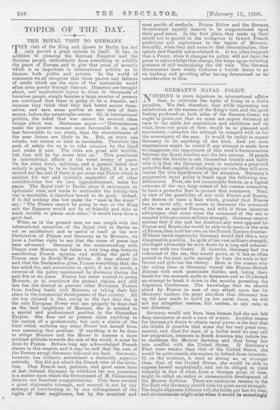TOPICS OF THE DAY.
THE ROYAL VISIT TO GERMANY.
THE visit of the King and Queen to Berlin has not only proved a great success in itself. It has, in addition to pleasing the German Emperor and the German people, undoubtedly done something to solidify the peace of Europe, and to give that sense of security which is as important in international politics as to finance, both public and private. In the world of commerce we all recognise that those ,panics and failures of credit which are the Wars of the mercantile world often arise purely through distrust. Disasters are brought about, and incalculable injury is done to thousands of harmless people, simply because a large number of persons are convinced that there is going to be a disaster, and because they think that they had better secure them- selves, and save' some portion at any rate of their money, before the catastrophe occurs. So, in international politics, the belief that war cannot be avoided often brings about war. Statesmen argue :—" Circumstances make the present moment more favourable to us, and less favourable to our rivals, than the circumstances of the near future are likely to be. But, as every one admits, war sooner or later is inevitable. Therefore the path of safety for us is to take occasion by the hand and make it now. The risks are great and terrible, but they will be far worse later on." This pessimism in international affairs is the worst enemy of peace. On the other hand, optimism, and a general belief that nobody is going to be so foolish as to fight, if it is not carried too far, and if there is not some one Power which is anxious for war and cynically neglectful of all other considerations but its own aggrandisement, make for peace. The Royal visit to Berlin, since it encourages an optimistic view, and tends to contradict the feeling that war is inevitable, is therefore bound to do good. Indeed, if it did nothing else but make the "man in the street" say : " The Powers cannot be going to war, or the King and the Emperor would not be so friendly and take so much trouble to please each other," it would have done a good deal.
When, as in the present case, we can couple with the international amenities of the Royal visit to Berlin an act so satisfactory and so useful in itself as the new Declaration of France and Germany as to Morocco, we have a further right to say that the cause of peace has been advanced. Germany in the understanding with France over Morocco has taken a very long step towards conciliating French opinion, and making the path of France easy in North-West Africa. It may almost be said that the Declaration gives France everything that she has asked for, and constitutes in spirit, if not in words, a reversal of the policy maintained by Germany during the past five or six years. France has never wanted to annex Morocco, or to overthrow the present regime, and still less has she desired to prevent other European Powers from trading freely with Morocco, or taking their fair share in the commercial development of that country. All she has claimed is that, owing to the fact that she is the only European Power who can properly be described as the land neighbour of Morocco, she is entitled to a special and predominant. position in the Shereefian Empire. She does not at present claim anything in the nature of a protectorate, but only a status of the kind which excludes any other Power but herself from over assuming that position. If anything is to be done to oblige Morocco and the Moors to assume a more civilised attitude towards the rest of the world, it must be done by France. .Britain long ago acknowledged French claims in this respect, and it may be said that the rest of the Powers except Germany followed our lead. Germany, however, has hitherto maintained a distinctly separate attitude. She did not admit the French view of the situa- tion. That French tact, patience, and good sense have at last induced Germany to withdraw her on posaumus is a matter upon which the Government of M. Clemenceau deserve our heartiest congratulations. They have secured a great diplomatic triumph, and secured it, not by any attempt at browbeating or by any infringement of the rights of their neighbours, but by the soundest and most pacific of methods. Prince Billow and the German Government equally deserve to be congratulated upon their good sense. In the first place, they made up their minds not to persist in the endeavour to thwart French ambitions and aspirations in the region of Morocco. Secondly, when they had come to that determination, they openly and frankly acknowledged it. It too often happens that a Power, when it changes its policy, will not have the grace to acknowledge that change, but keeps up an irritating pretence of still maintaining the old view. The German Government have wisely forborne a foolish desire to go on barking and growling after having determined on no' consideration to bite.









































 Previous page
Previous page